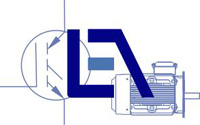Zoubek
Dipl.-Ing. Henning Zoubek
"Drehgeberlose Indentifikation schwingungsfähiiger Mehrmassensysteme und Diagnose von Lagerfehlern im Antriebsstrang durch Frequenzgangmessung"
Economic reasons and the possible increase of reliability of drive system have led to a high approval for encoderless control technologies for speed-variable driven plants in academia and industry. The developed control techniques without the usage of speed measurement equipment are manifold applicable for different applications but imply rigid mechanical systems for the model-based speed estimation process. In case of nonrigid mechanical setups that can oscillate in torsional direction like two-mass-systems, there is no sensorless speed identification technique at hand that considers the specific dynamic behavior of these mechanical systems.
Therefore, this thesis focusses on the development of a new sensorless identification method that provides a reliable two-step-solution for more accurate speed evaluation for two-inertia-systems based on frequency response calculation. Within the first identification step, a standard model-based speed adaptive observer structure serves for the speed estimation under the only pre-condition that the easy to identify inertias of the mechanical system are known. If the mechanical system shows a non-rigid two-masscharacteristic, the resulting identified frequency response will reveal the resonant frequency as a reliable indication for the multi-inertia behavior. Based on this knowledge the adaptive observer topology can be extended by means of a mechanical model in a way that the full dynamic characteristic of the two-mass-system can be reliably identified within the second identification step including information about the anti-resonant frequency. Hence, the new encoderless strategy provides the possibility for more accurate speed estimation than with the established methods taking into account the special dynamic characteristic of the multi-mass-plant. This technique is also a valuable pre-condition for the application of specialized controller designs to allow high dynamic encoderless control of two-mass-setups. For a functional implementation of these controller structures, the reliable identification of the mechanical parameters is a fundamental cornerstone that has to be executed during the commissioning of the plant for which the presented encoderless method can provide the required information.
Based on the theoretical derivations in this thesis, manifold experimental investigations underline the reliability of the new proposal for encoderless speed estimation and identification. The presented sensorless identification strategy confirms its stable applicability for different mechanical setups as well as under varying operating conditions. Parameter studies prove a wide range of possible adjustments for the signal processing method as well as for the extended observer structure that allow a dependable identification of the mechanical characteristics of the system by frequency response computation.
Further studies in the thesis reveal the capability of the proposed identification method to serve as a diagnosis tool for alterations in the mechanical system characteristics. With the measured curves from the commissioning of the system as reference, a change of the mechanical structure like for varying load side inertias can be detected and adjusted. Also, the possibility to uncover functional degradation of mechanical elements for rolling bearings is under investigation in theory and practical experiments for the proposed method. The results for outer race bearing faults accentuate that the encoderless identification strategy is capable to identify the bearing damage in the measured frequency response due to the imposed impacts on the machine currents. Deviations from the reference curve at the characteristic fault frequencies clearly indicate the presence of the outer race bearing fault in the system. In case of an inner race bearing fault, the encoderless identification strategy cannot reveal an affirmative diagnosis result in the different experimental studies as the varying impact magnitude for this kind of fault does not sufficiently reflect into the one-channel signal processing based on the machine currents for the frequency response calculation. For the wide area of broadband bearing faults, positive fault diagnosis capability is proved in the simulation studies and under experimental conditions where a broadband impact on the frequency response is clearly visible in presence of the fault.
